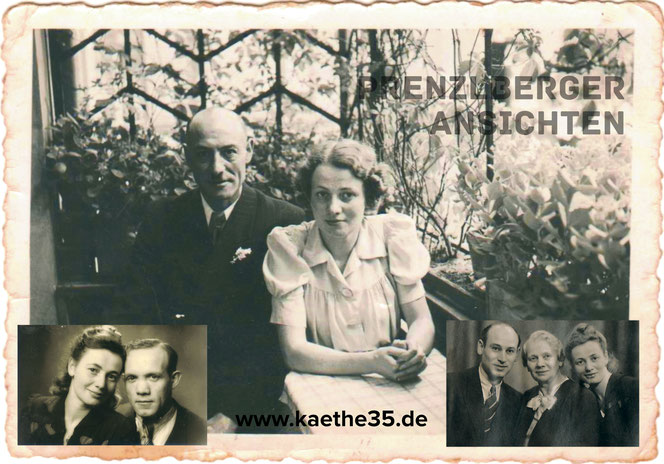JEWISH LIFE IN PRENZLAUER BERG, PART 4
LEWINNEK FAMILY
For the inauguration of the Silent Bell Board at Käthe-Niederkirchner-Str. 35, also a guest from Sydney came to the Bötzow quarter in May 2019: Martin Schott. His mother Gerda Lewinnek grew up here. This 4th part of our series is about her family.
Among the first and longest tenants in the house of Isidor and Lina Lewy was the Lewinnek family. Martin Lewinnek (Jewish) and his wife Emma (Protestant) lived there since about 1912, and both their children Gerda (born 1914) and Norbert (born 1916) grew up here, living in peaceful coexistence of both religions.
Martin Moritz Lewinnek was born on August 13, 1891 in Tuchel/West Prussia. While many of the later Jewish inhabitants of the house do not come to Berlin from the now Polish territories until after the end of World War I, Lewinnek moves there earlier, married to Emma Pauline Kügler, born on January 24, 1887 in Liegnitz/Silesia. Their children Gerda and Norbert are thus born in Berlin and live for a good 30 years with their parents in the side wing of (1974 renamed) Lippehner Straße 35.
Martin Lewinnek can be found in the address books from 1915 as a merchant, laborer, butcher, and from 1934 also as a coachman. In an interview in 1983 his daughter remembers that he worked at the municipal cattle and slaughterhouse. Later known as the "Horse Jew", he is also assistant to "Hänschen" Frömming, one of the most successful trotting riders to this day.
In 1940, Lewinnek is denounced for alleged "racketeering" and "black slaughtering" and is arrested by the Gestapo at his workplace, interrogated and tortured for several weeks. He is no longer allowed to enter the cattle yard, although his head master wants to rehire him after his release. Saved from deportation by his so-called mixed marriage to an "Aryan" woman, he is conscripted and placed "on demolition duty" to remove bomb damage at the risk of his life.
On October 20, 1941 he dies in the Jewish Hospital at the age of 50 as a "broken man who did not even have the strength to commit suicide" (according to Knut Elstermann in the book "Gerdas Schweigen"). His gravestone can still be found today at the Jewish Cemetery Weißensee.

His widow Emma, who works as a "cold mamsel" in the city kitchen, among other things, is subsequently repeatedly detained with both children in collection camps. Since there is no reason for her arrest as a non-Jew, she manages to take her children home with her several times. From 1940, Gerda has to spin parachute silk under difficult working conditions at IG Farben; she spends her limited free time working at home as a seamstress.
Finally, however, Gerda and Norbert are imprisoned from the end of 1944 until April 20, 1945 in the Schulstr. 78 collection camp, locked up in the rooms of the former pathology department of the Jewish hospital, where they had last seen their dead father in 1941. They were interrogated and mistreated by SS camp director Dobberke, to whose capture by Soviet soldiers Gerda was to contribute a short time later.
Her friend Bully Schott, same age as Gerda, is a trained electromechanic and as a boxer in the Makkabi sports club being Brandenburg state champion. In 1939, he is sent to Sachsenhausen for forced labor, being deported from there to Auschwitz-Monowitz in 1942, where he is used to build up the IG Farben plant in Buna. In 1944, he manages to escape also with Gerda's help, who takes the train to Auschwitz in preparation for his escape, and goes into hiding in Berlin. As early as June 1945, the two are married at Pankow City Hall, with the religious wedding ceremony following in 1947 after Gerda's conversion to Judaism.
In 1947, her brother Norbert, a furrier by trade, writes in a letter to Lina Lewy's brother, who had emigrated to America: "For us there is only one goal, to emigrate from Germany as quickly as possible, because in a country where one has had to experience so much unbearable suffering, one can never be happy again, even if it will still be so good for us here." A year later he flies with his mother to Sydney, where they will both stay.
Gerda follows them and emigrates by ship from Genoa in 1950, together with her husband Bully and their 20-month young son Martin. Their start-up capital for a new life is initially lost on the journey with Martin's baby carriage (in which all the cash is stowed), but fortunately can be recovered upon arrival.
Emma is buried at the Jewish cemetery in 1969. Gerda dies in 1993, Bully in 2000, Norbert in 2001.
Even though the family leaves Berlin for good, the experiences of their persecution remain formative throughout their lives.
Lucy, Martin Schott's daughter, born in Sydney in 1983, receives German citizenship in 2020 after waiting for six years.
Simon Lütgemeyer / M. Steinbach
Source: www.kaethe35.de
